MIT Sloan is the leader in research and teaching in AI. Dive in to discover why.

Which program is right for you?

Through intellectual rigor and experiential learning, this full-time, two-year MBA program develops leaders who make a difference in the world.
Earn your MBA and SM in engineering with this transformative two-year program.
A rigorous, hands-on program that prepares adaptive problem solvers for premier finance careers.
A 12-month program focused on applying the tools of modern data science, optimization and machine learning to solve real-world business problems.
Combine an international MBA with a deep dive into management science. A special opportunity for partner and affiliate schools only.
A doctoral program that produces outstanding scholars who are leading in their fields of research.
Bring a business perspective to your technical and quantitative expertise with a bachelor’s degree in management, business analytics, or finance.
Apply now and work for two to five years. We'll save you a seat in our MBA class when you're ready to come back to campus for your degree.
Executive Programs
The 20-month program teaches the science of management to mid-career leaders who want to move from success to significance.
A full-time MBA program for mid-career leaders eager to dedicate one year of discovery for a lifetime of impact.
A joint program for mid-career professionals that integrates engineering and systems thinking. Earn your master’s degree in engineering and management.
Non-degree programs for senior executives and high-potential managers.
A non-degree, customizable program for mid-career professionals.
PhD Program in Finance
2023-24 curriculum outline.
The MIT Sloan Finance Group offers a doctoral program specialization in Finance for students interested in research careers in academic finance. The requirements of the program may be loosely divided into five categories: coursework, the Finance Seminar, the general examination, the research paper, and the dissertation. Attendance at the weekly Finance Seminar is mandatory in the second year and beyond and is encouraged in the first year. During the first two years, students are engaged primarily in coursework, taking both required and elective courses in preparation for their general examination at the end of the second year. Students are required to complete a research paper by the end of their fifth semester, present it in front of the faculty committee and receive a passing grade. After that, students are required to find a formal thesis advisor and form a thesis committee by the end of their eighth semester. The Thesis Committee should consist of at least one tenured faculty from the MIT Sloan Finance Group.
Required Courses
The following set of required courses is designed to furnish each student with a sound and well-rounded understanding of the theoretical and empirical foundations of finance, as well as the tools necessary to make original contributions in each of these areas. Finance PhD courses (15.470, 15.471, 15.472, 15.473, 15.474) in which the student does not receive a grade of B or higher must be retaken.
First Year - Summer
Math Camp begins on the second Monday in August.
First Year - Fall Semester
14.121/14.122 Micro Theory I/II
14.451/14.452 Macro Theory I/II ( strongly recommended)
14.380/14.381 — Statistics/Applied Econometrics
15.470 — Asset Pricing
First Year - Spring Semester
14.123/14.124 Micro Theory III/IV
14.453/14.454 Macro Theory III/IV (strongly recommended)
14.382 – Econometrics
15.471 – Corporate Finance
Second Year - Fall Semester
15.472 — Advanced Asset Pricing
14.384 — Time-Series Analysis or 14.385 — Nonlinear Econometric Analysis (Enrolled students receive a one-semester waiver from attending the Finance Seminar due to a scheduling conflict)
15.475 — Current Research in Financial Economics
Second Year - Spring Semester
15.473 — Advanced Corporate Finance
15.474 — Current Topics in Finance (strongly encouraged to take multiple times)
15.475 — Current Research in Financial Economics
Recommended Elective Courses
Beyond these required courses, students are expected to enroll in elective courses determined by their primary area of interest. There are two informal “tracks” in Financial Economics: Corporate Finance and Asset Pricing. Recommended electives are designed to deepen the student's grasp of material that will be central to the writing of his/her dissertation. Students also have the opportunity to take courses at Harvard University. There is no formal requirement to select one track or another, and students are free to take any of the electives.

LERNER BUSINESS & ECONOMICS
- Financial Services Analytics (FSAN) (Ph.D.)
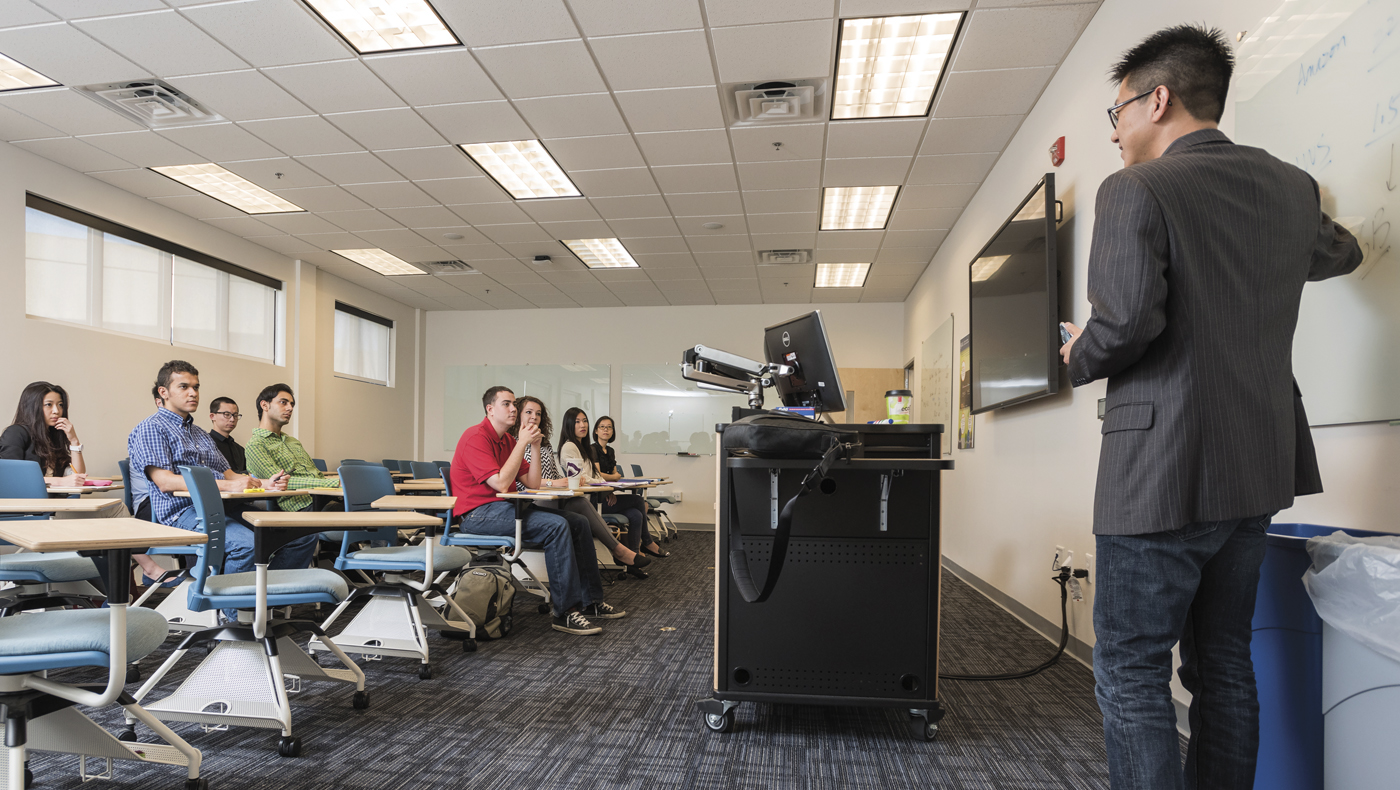
Student Research Topics
FSAN students work closely with their supervisors to identify cutting-edge research topics related to modern data science theory, algorithms and applications in banking and the financial and tech industries. Sample dissertation topics include:
- Bayesian causal inference
- predictive analytics
- bank systemic risk
- malware detection and classification
- credit card fraud detection
- NLP & chat-bots
- link recommendation
- text-based industry classification
- loan process optimization
- customer targeting
- active learning on graphs
Career Opportunities
Our program generates excellent internship opportunities and industry and academic job prospects.
Corporate-sponsored internships offer you the opportunity to apply analytics tools to real-world challenges on teams in wealth management, machine learning, data architecture, investment banking, global finance and business management. Most students gain internship experience while pursuing their Ph.D. degrees.
FSAN graduates are researchers and professionals who play key roles in teams that bridge the financial services industry and data and operational sciences. They are now employed as data scientists in major banks, fintech companies and technology companies. The FSAN program works closely with Lerner Career Services to provide personalized, high quality career assistance.
Where Our Students Intern
- JP Morgan Chase & Co
Where Our Graduates Work
Academic Institutions:
- Chinese University of Hong Kong (Shenzhen)
- Shanghai University of Finance & Economics
- University of Delaware
- Virginia Tech
Banking and Financial Services:
- Bank of America
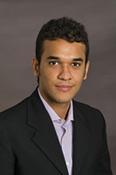
"UD was able to merge finance, data mining, statistics and other areas to create the FSAN program. This is also reflected in the diversity of the students. We come from different fields, and it is wonderful how we are able to complement each other in so many different ways."
- FSAN student Leonardo De La Rosa Angarita
- Lerner Graduate Student Stories: Dayu Yang - Dayu Yang is a postdoctoral researcher in the financial services analytics (FSAN) Ph.D. program at Lerner College and is expected to graduate in Spring 2025. He was recently offered a full-time postdoctoral research job from Meta AI.
- Lifelong Lerner: Chuan Cai - As a member of the University of Delaware’s Alfred Lerner College of Business and Economics’ class of 2024, Chuan Cai, financial services analytics Ph.D. from Lu’an, Anhui, China has thoroughly demonstrated his excellence and dedication during his time at UD.
- Unique Lerner FSAN Program Lands Graduates in Top Financial Technology Jobs - As businesses increasingly search for workers skilled in tools like machine learning, artificial intelligence and language models, this program is turning out graduates ready for the job.
- What Is Fintech? - This article explains what fintech is, introduces jobs and salaries in the field and compares different ways of learning the subject.
- On the Job with Oliver Yao: New Lerner Dean Is Focused on the Promise of FinTech - Oliver Yao, the new dean of the Alfred Lerner College of Business and Economics, wants the college to be at the center of the financial technology revolution.
Contact Dr. Bintong Chen 302-831-2756 [email protected]
Explore the doctorate in FSAN by viewing a recent FSAN information session.
Admissions Information
We accept students every other year, in the even-numbered years. The application deadline for the next cohort (beginning fall semester 2024) is May 1, 2024. Students seeking financial aid should submit their applications by February 1, 2024, but late applications will be considered if funds are available. Highly-qualified students may receive research scholarships as well as a generous stipend to cover all educational expenses.
- Economics (Ph.D.)
- Economic Education (Ph.D.)
- Hospitality Business Analytics (Ph.D.)
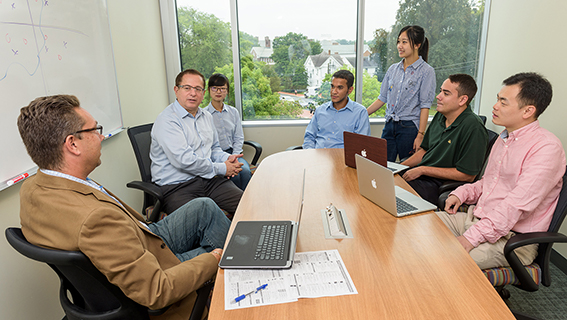
PhD in Data Science: Program Overview
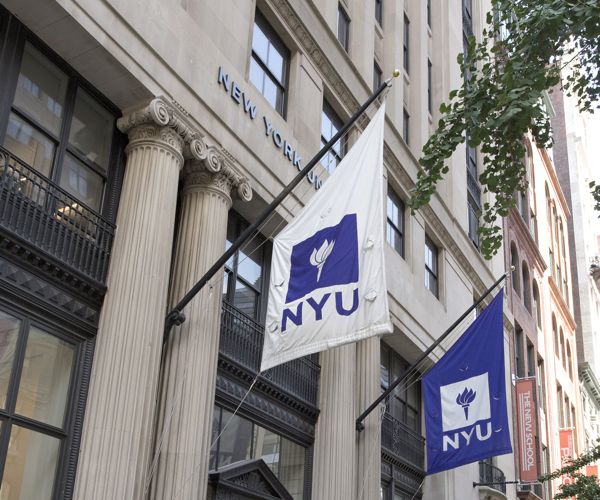
The field of data science has emerged from advances in computational speed, data availability, and novel analysis methods. It demands a new type of researcher: the rigorously trained, cross-disciplinary, and ethically responsible data scientist.
Launched in Fall 2017, the pioneering CDS PhD Data Science program seeks to produce such researchers. It has gained recognition as one of the top and most selective data science doctoral programs globally, earning an NSF NRT training grant.
CDS PhD students are also being recognized for their outstanding contributions to the field of data science through fellowships and awards that range from industry-sponsored programs like Microsoft Research, Google, and Apple to academic honors such as the National Science Foundation Graduate Research Fellowship.
The CDS PhD program rigorously trains future data scientists to:
- Develop methodologies and use statistical tools to answer cross-disciplinary questions
- Clearly communicate to extract precise questions from big, heterogeneous, uncertain data
- Translate research insights into practical applications across sciences, medicine, industry, and government
- Understand the ethical implications of their work
Our mission is to nurture this new generation of data scientists in an environment where methodological innovations are developed and successfully applied to various domains. We believe that combining fundamental research on the principles of data science with translational projects involving domain experts creates a virtuous cycle, advancing both data science methodology and real-world applications.
The program has an innovative core curriculum, a novel data assistantship mechanism that provides training of skills transfer through rotations and internships, and communication and entrepreneurship modules. Students are exposed to a wider range of fields than in traditional PhD programs while working with our interdisciplinary faculty. We also offer a medical school track for those interested in healthcare applications or developing novel theoretical models from medical questions.
Successful candidates are guaranteed financial support, including tuition and a competitive stipend, for up to five years in the fall and spring semesters.*
We invite you to learn more through our webpage or by contacting [email protected] . *Students also have the opportunity to pursue their study and research with Data Science faculty at NYU Shanghai . With this opportunity, students generally complete their coursework in New York City before moving full-time to Shanghai for their research. For more information, please visit the NYU Shanghai Ph.D. page .
Start typing and press enter to search
Ph.D. Specialization in Data Science
The ph.d. specialization in data science is an option within the applied mathematics, computer science, electrical engineering, industrial engineering and operations research, and statistics departments..
Only students already enrolled in one of these doctoral programs at Columbia are eligible to participate in this specialization. Students should fulfill the requirements below in addition to those of their respective department's Ph.D. program. Students should discuss this specialization option with their Ph.D. advisor and their department's director for graduate studies.
Applied Mathematics Doctoral Program
Computer Science Doctoral Program
Decision, Risk, and Operations (DRO) Program
Electrical Engineering Doctoral Program
Industrial Engineering and Operations Research Doctoral Program
Statistics Doctoral Program
The specialization consists of either five (5) courses from the lists below, or four (4) courses plus one (1) additional course approved by the curriculum committee. All courses must be taken for a letter grade and students must pass with a B+ or above. At least three (3) of the courses should come from outside the student’s home department. At least one (1) course has to come from each of the three (3) thematic areas listed below.
Specialization Requirements
- COMS 4231 Analysis of Algorithms I
- COMS 6232 Analysis of Algorithms II
- COMS 4111 Introduction to Databases
- COMS 4113 Distributed Systems Fundamentals
- EECS 6720 Bayesian Models for Machine Learning
- COMS 4771 Machine Learning
- COMS 4772 Advanced Machine Learning
- IEOR E6613 Optimization I
- IEOR E6614 Optimization II
- IEOR E6711 Stochastic Modeling I
- EEOR E6616 Convex Optimization
- STAT 6301 Probability Theory I
- STAT 6201 Theoretical Statistics I
- STAT 6101 Applied Statistics I
- STAT 6104 Computational Statistics
- STAT 5224 Bayesian Statistics
- STCS 6701 Foundations of Graphical Models (joint with Computer Science)
Information Request Form
Ph.d. specialization committee.
- View All People
- Faculty of Arts and Sciences Professor of Statistics
- The Fu Foundation School of Engineering and Applied Science Professor of Computer Science
Richard A. Davis
- Faculty of Arts and Sciences Howard Levene Professor of Statistics

Vineet Goyal
- The Fu Foundation School of Engineering and Applied Science Associate Professor of Industrial Engineering and Operations Research
Garud N. Iyengar
- Data Science Institute Avanessians Director of the Data Science Institute
- The Fu Foundation School of Engineering and Applied Science Professor of Industrial Engineering and Operations Research
Gail Kaiser
Rocco a. servedio, clifford stein.
- The Fu Foundation School of Engineering and Applied Science Wai T. Chang Professor of Industrial Engineering and Operations Research and Professor of Computer Science
John Wright
- The Fu Foundation School of Engineering and Applied Science Associate Professor of Electrical Engineering
- Data Science Institute Associate Director for Research
- Corporate Relations
- Future Students
- Current Students
- Faculty and Staff
- Parents and Families
- High School Counselors
- Academics at Stevens
- Find Your Program
- Our Schools
Undergraduate Study
- Majors and Minors
- SUCCESS - The Stevens Core Curriculum
- The Foundations Program
- Special Programs
- Undergraduate Research
- Study Abroad
- Academic Resources
- Graduate Study
- Stevens Online
- Corporate Education
- Samuel C. Williams Library
Discover Stevens
The innovation university.
- Our History
- Leadership & Vision
- Strategic Plan
- Stevens By the Numbers
- Diversity, Equity and Inclusion
- Sustainability
Student Life
New students.
- Undergraduate New Students
- Graduate New Students
The Stevens Experience
- Living at Stevens
- Student Groups and Activities
- Arts and Culture
Supporting Your Journey
- Counseling and Psychological Services
- Office of Student Support
- Student Health Services
- Office of Disability Services
- Other Support Resources
- Undergraduate Student Life
- Graduate Student Life
- Building Your Career
- Student Affairs
- Commencement
- Technology With Purpose
- Research Pillars
- Faculty Research
- Student Research
- Research Centers & Labs
- Partner with Us
Admission & Aid
- Why Stevens
Undergraduate Admissions
- How to Apply
- Dates and Deadlines
- Visit Campus
- Accepted Students
- Meet Your Counselor
Graduate Admissions
- Apply to a Graduate Program
- Costs and Funding
- Visits and Events
- Chat with a Student
Tuition and Financial Aid
- How to Apply for Aid
- FAFSA Simplification
- Undergraduate Costs and Aid
- Graduate Costs and Funding
- Consumer Info
- Contact Financial Aid
- International Students
Veterans and Military
- Military Education and Leadership Programs
- Stevens ROTC Programs
- Using Your GI Bill
- Pre-College Programs

Data Science Doctoral Program
Program details.
Gain in-demand skills in emerging areas like artificial intelligence, machine learning and language processing in a Ph.D. program designed with input from industry leaders.
An interdisciplinary degree program of the Schaefer School of Engineering and Science and the Stevens School of Business, the data science Ph.D. curriculum drives students to master the bedrock principles, methods and systems for extracting insights from rich data sets. Then, you’ll apply those theories, techniques and applications in practical research alongside Stevens faculty who are working at the forefront of the data science field. Our graduates go on to pursue research careers in academia and secure important positions in industries like business, financial services and life sciences.
The Department of Computer Science offers dynamic opportunities to explore leading-edge research within a close community of faculty mentors. You'll be able to study under a faculty mentor in the area that you find most exciting:
Theoretical underpinnings of data science, including machine learning and artificial intelligence
Applications of data science to financial services
Applications of data science to the life sciences
Areas of Focus
Mathematical and statistical modelling including multivariate analytics, financial time series and dynamic programming techniques
Machine learning and artificial intelligence applications for statistical learning and financial analytics
Computational systems, exploring advanced algorithm design, distributed systems and cloud technologies
Data management at scale, involving a deeper dive into data technologies, mobile systems and data management
The Stevens Advantage: Widen Your Career Options
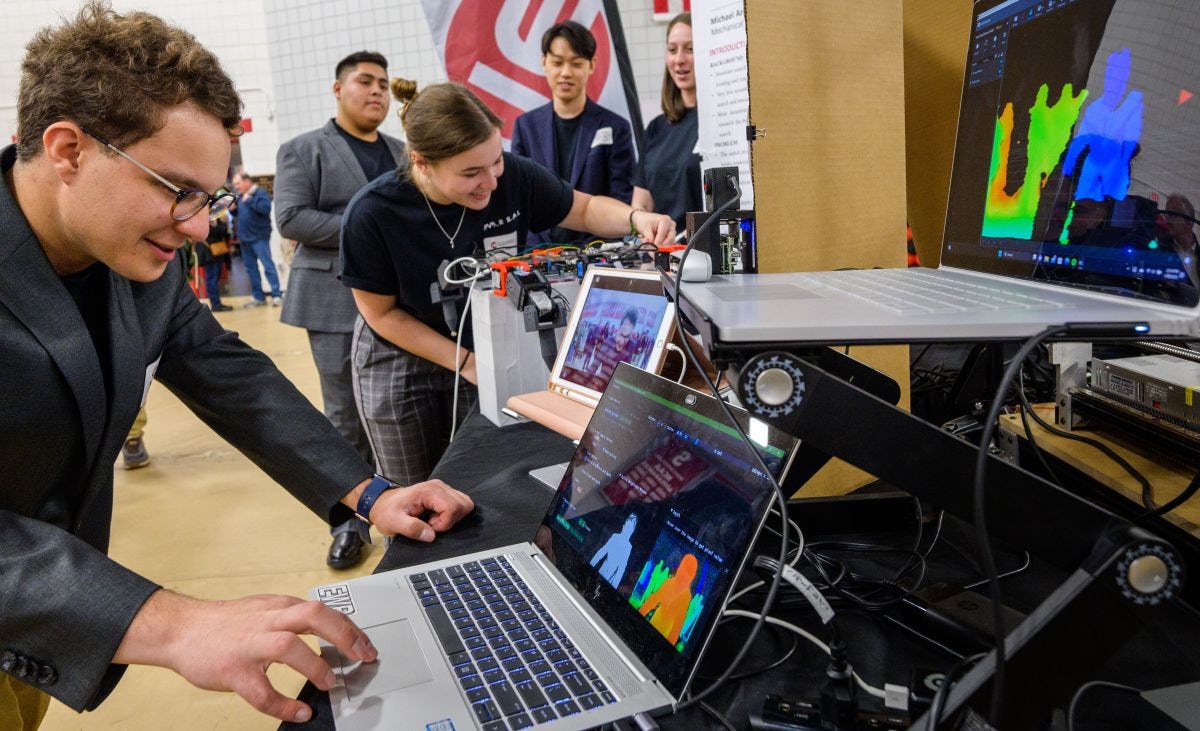
Learn more about what makes graduate education from Stevens a unique experience:
Graduate Cooperative Education Program : Available with two tracks, your co-op experience can serve as a starting point for a research project or augment your on-campus research with complimentary experience.
International Student Experience : Tap into our expanding worldwide network of research, academic and alumni partners and mentor with our expert faculty in a number of federally-designated STEM degree programs. Optional Practical Training (OPT) or Curricular Practical Training (CPT) is available to gain work experience in your major/field of study.
State-of-the-Art Research Labs and Facilities : Build, tinker and test your designs in Stevens' MakerCenter, Prototype and Object Fabrication Lab, or numerous other research facilities.
Research Opportunities : Renowned faculty, labs and research centers – as well as industry partnerships and funding from leading national agencies – support strategic and interdisciplinary research in engineering and science.
Assistantships and Fellowships: Stevens offers funding to select graduate students in the form of teaching assistantships, research assistantships and fellowships. Limited in number, these highly competitive opportunities are awarded to exceptional candidates based on merit.
Expanded Learning Options : The Schaefer School offers new opportunities for doctoral students to do coursework at universities in the New York City area – and around the world – through our growing list of academic partnerships with other prestigious universities. Learn more about our latest partnerships.
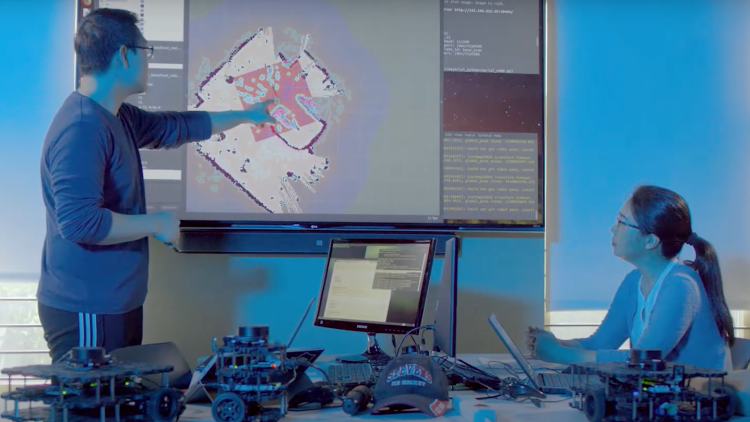
Computer Science Research
The computer science department at Stevens offers you a maximum amount of flexibility to pursue research opportunities in cutting-edge, competitive areas of exploration like secure systems, machine learning, cryptography and visual computing. You’ll work with recognized leaders in the field, gain exposure to top industry labs and learn sought-after principles that will help propel your career. Learn more about research in the Department of Computer Science.
Program Admission Requirements
We welcome applicants with a master’s degree in a technical discipline (such as computer science, business intelligence and analytics, financial analytics, financial engineering or biomedical engineering and chemical biology). However, exceptional applicants with a bachelor’s degree and relevant work experience will also be considered.
Students may begin this Ph.D. program in the fall semester only. Therefore, applications must be submitted by February 1 for admission the following fall. Applicants are generally notified of their admission status around February 15.
Prerequisite courses in calculus, statistics, probability, algebra and database management
Fluency in at least one programming language, like C++ or Java
Transcripts from all post-secondary institutions attended
Two letters of recommendation (academic or professional only; Select Ph.D. programs require a third letter of recommendation)
Statement of Purpose
$60 non-refundable Application Fee
Proof of English language proficiency
A competitive GRE or GMAT score (required for both part-time and full-time applicants)
Writing sample(s). All applicants are encouraged to submit a lab report (preferable) or paper that they wrote, individually, for an engineering course. Applicants who have published a journal article are also encouraged to submit a copy of their article.
For more complete details, visit our General Admissions Requirements page .
Apply Online >
View objectives, outcomes, and other Ph.D. curriculum details in the most recent academic catalog.
View Academic Catalog >
Each Ph.D. curriculum must also adhere to the institution wide standards listed in the doctoral handbook.
View Doctoral Handbook >
If you have existing graduate credits or experience in this area of study, contact [email protected] to discuss opportunities to include it in the curriculum.
Information about assistantships and fellowships can be found here .
The four fields comprising STEM – science, technology, engineering and mathematics – offer a wide variety of professions that are classified as some of the highest-growing and highest-paying jobs right now and in the future. And for international students, the demand for STEM-related professionals in the United States can open the door for an extended stay. An ever-growing list of eligible programs across all levels is available here .
A Tech Forward Education
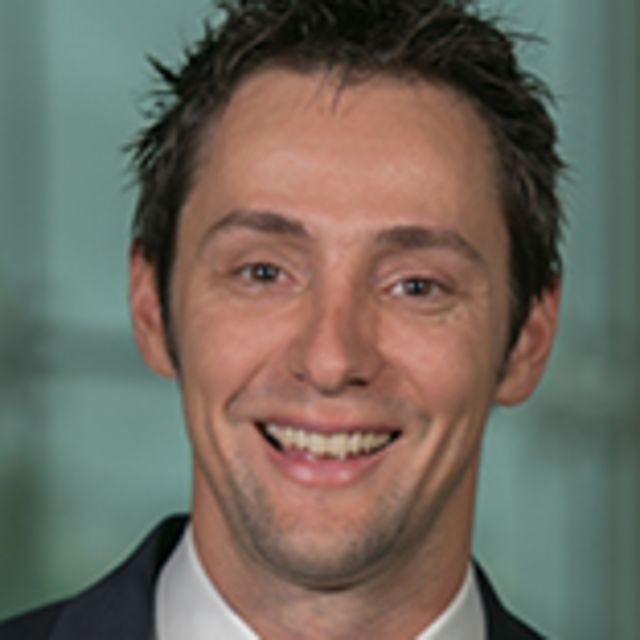
An expert in data mining and deep learning, Dr. Lappas is an authority in the business impact of fake reviews in social media.
Data Science Faculty

A former chief scientist at AT&T Labs, Dr. Belanger has earned more than 30 patents related to data science and business analytics.
David Belanger

A highly cited business researcher investigating applications of machine learning and social network algorithms to solve finance problems.
Germán Creamer
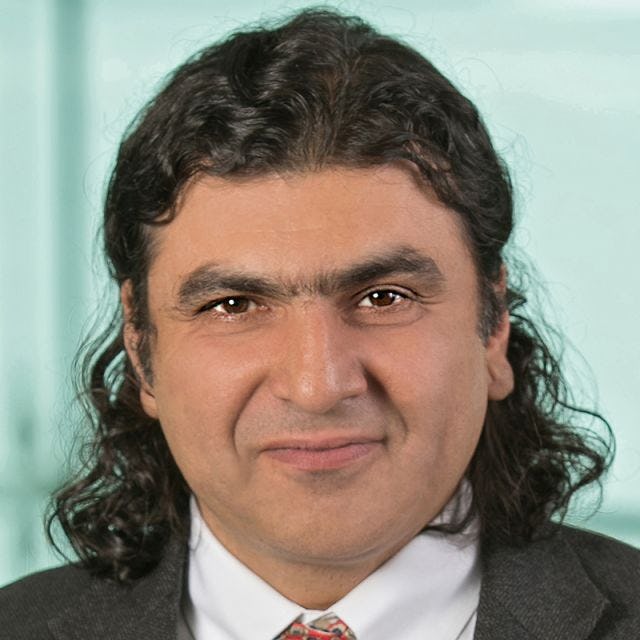
Dr. Florescu is an expert in creating stochastic models for practical application. He leads an international conference on high frequency in finance.
Ionut Florescu
Related Programs
Computer science doctoral program.
Prepare to make an enduring impact in fields like machine learning, artificial intelligence and cybersecurity with a Ph.D. in computer science from Stevens.
Interdisciplinary Programs
The challenges facing today's scientists and engineers often exist at the intersection between various disciplines–whether between engineering and science or fields within individual disciplines. At Stevens, engineering and science come together under one roof, fostering a proactive, interdisciplinary environment that encourages results-driven collaboration and unique, innovative problem solving.

- Youth Program
- Wharton Online
PhD Program
Wharton’s PhD program in Statistics provides the foundational education that allows students to engage both cutting-edge theory and applied problems. These include problems from a wide variety of fields within Wharton, such as finance, marketing, and public policy, as well as fields across the rest of the University such as biostatistics within the Medical School and computer science within the Engineering School.
Major areas of departmental research include: analysis of observational studies; Bayesian inference, bioinformatics; decision theory; game theory; high dimensional inference; information theory; machine learning; model selection; nonparametric function estimation; and time series analysis.
Students typically have a strong undergraduate background in mathematics. Knowledge of linear algebra and advanced calculus is required, and experience with real analysis is helpful. Although some exposure to undergraduate probability and statistics is expected, skills in mathematics and computer science are more important. Graduates of the department typically take positions in academia, government, financial services, and bio-pharmaceutical industries.
Apply online here .
Department of Statistics and Data Science
The Wharton School, University of Pennsylvania Academic Research Building 265 South 37th Street, 3rd & 4th Floors Philadelphia, PA 19104-1686
Phone: (215) 898-8222
- Contact Information
- Course Descriptions
- Course Schedule
- Doctoral Inside: Resources for Current PhD Students
- Penn Career Services
- Apply to Wharton
- Financial Aid

IMAGES
VIDEO
COMMENTS
A 12-month program focused on applying the tools of modern data science, optimization and machine learning to solve real-world business problems.
The financial services analytics (FSAN) doctoral program at the University of Delaware (UD) is the first of its kind, developing fundamental data science theories and models, and creating data-driven decision-making tools applicable to the financial services industry and other technology industries. It is an interdisciplinary STEM-designated ...
Discover NYU's PhD in Data Science, a top-ranked program offering rigorous training, cross-disciplinary research, and guaranteed funding. Learn more today.
The Ph.D. specialization in data science is an option within the Applied Mathematics, Computer Science, Electrical Engineering, Industrial Engineering and Operations Research, and Statistics departments.
The Ph.D. in Data Science drives students to master principles for extracting insights from rich data sets and applying them to practical research. Graduates become research leaders in the data revolution and into the age of A.I. and machine learning.
Wharton’s PhD program in Statistics provides the foundational education that allows students to engage both cutting-edge theory and applied problems. These include problems from a wide variety of fields within Wharton, such as finance, marketing, and public policy, as well as fields across the rest of the University such as biostatistics ...